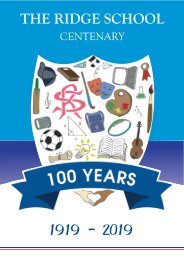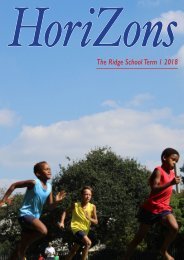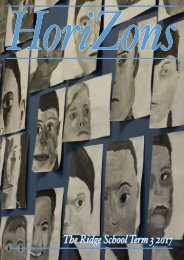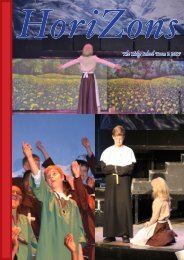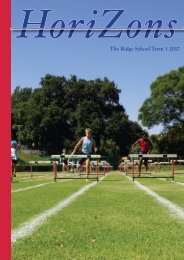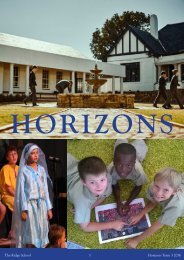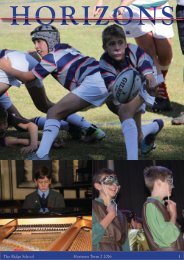You also want an ePaper? Increase the reach of your titles
YUMPU automatically turns print PDFs into web optimized ePapers that Google loves.
OVERVIEWS
SENIOR PREP
The (COVID) Cloud has a Silver Lining
The Greek Philosopher Heraclitus once said that “Change is the only
constant in life.” I’m assuming that he must have been a very wise man
because there are not many of us who like change. Some resist change
because we enjoy our routine and fear we may lose something valuable
if we adapt. Some feel a sound sense of safety and security, so why the
need to change what’s already working.
What Heraclitus didn’t factor in is that Covid-19 decided to take him
up on his prophecy and change the world as we knew it into economic
turmoil, increase the social and emotional strain on us and our children
as well as to adapt psychologically and physiologically to all that came
our way. The COVID cloud overshadowed the world, and has, and will
continue to bring with it an after-effect that will be felt in the months,
and years to come.
However, as with every ominous storm, there is a silver lining. The storm
that, and still is Covid-19, has brought with it its very own glimmer of
hope. Nature had found its way back into prominence, families were
able to spend good, quality time together, and although essential workers
were performing miracles well into the night, they had the whole world
behind them, rooting for them in the streets and from the balconies to
show their support and appreciation for their dedication.
LIFE AS WE KNEW IT
The root word for ‘change’, taken from the Old French, ‘changier’ is
described as ‘becoming different, or altered’. Life as we knew it did just
that. South Africa entered Lockdown Level 5 at midnight on the 26th
March. Our country changed, our habits changed, our routines changed,
but so did the way in which we had to educate not only ourselves
but our students too. The announcement made by our esteemed
President Cyril Ramaphosa on the eve of Sunday before lockdown sent
a reminder to every educator that change was inevitable, and this was
going to be our constant.
Although we had anticipated some of what was heading our way, the
realisation was that we had to adapt and, adapt quickly. There were
several staff meetings set up during the week before the announcement
to establish a shift from social, physical teaching to online, remote
teaching and learning. The Ridge School is not a remote school, and
I know that this article may speak to the converted as many schools
in South Africa are not remote (online) schools. I distinctly remember
conversations regarding screen time, synchronous and asynchronous
teaching and learning and flexible timetables increased the anxiety and
stress levels with staff, parents and our boys.
PHASES OF CHANGE
Part of our hidden curriculum at The Ridge School is a focus on grit,
resilience and perseverance. Kathie Nunley, in her book “A Student’s
Brain”, explains that due to the development of the prefrontal cortex,
adults experience functional fixedness that makes them see everything
exactly as it is. For instance, an adult will see a tennis racket exactly as it
is. In contrast, a child will see a broomstick as a cricket bat. The creativity
of children is caused by their prefrontal cortex, which gives them the
ability to be flexible and inventive. Children have minds that are designed
to learn and adults have minds designed to perform.
Our boys adapted very quickly to the change, a shift from what we
as adults, fixed in our ways, struggled with. Our staff had to transition
from content creators to digital natives in the space of a few days. Our
planning calendar, one that guides our every move had to take a ‘back
seat’ as certain events, assemblies, music soirees and the likes thereof
came to an abrupt end.
As a stand-alone, independent all-boys school, we were fortunate
enough to enter the April holidays, reflecting on three weeks’ worth of
remote teaching and learning, which gave us some respite to reflect on
past practices and the way
forward.
THE SILVER LINING
Although the COVID cloud
had descended upon us,
it was up to us as a team
to make sure that we
embraced the inevitable
change. The April holidays
seemed like a distant
memory when we started
the second term. Having had countless meetings, attending
several international webinars and investigating the best possible
solutions to aid in the way forward, we began an adventure quite literally
for us, into the unknown. Re-worked timetables, digital curriculums and
passionate staff began the quest into Term 2.
Phrases such as Google Classroom, Google Meets, synchronous and
asynchronous teaching and learning became prominent terms and
vocabulary that were used in our everyday conversations with our boys.
Little did we know that the ability to mute and unmute a microphone
online would be one of the 21st Century skills to equip ourselves with!
Our timetable had adjusted to suit the needs of both synchronous and
asynchronous teaching and learning. We had started the academic day
later so that families could enjoy the time spent together on a walk or
exercise in the mornings and we had taken the opportunity to reflect
on past experiences, which boded well in our remote journey as a team
of educators.
LESS IS MORE
As we progressed through the winter months, we came to realise that
content was easy to disseminate, but connection and emotional stability
was tantamount to making sure our boys felt secure and confident
with their day to day online interactions. We were in a fortunate
position insofar as our boys from Grade 4 - 7 were digitally and skillfully
equipped in the likes of Google Classroom, Google docs and the likes
thereof. Therefore, the transition into a digital curriculum was seamless,
at times.
Although the change may have seemed quite positive, we as a team
began to realise that the content seemed to take its toll on the boys.
After several weeks, we had decided that ‘less is more’, and that it was
far more beneficial to cover what was important within the curriculum
and subject itself, rather than overload the boys with additional work to
cover the content. In doing so, we found that the work ethic improved,
the stress and anxiety of trying to complete what would have been
completed in class diminished, and our educational views on what was
important within the lives of our boys shifted too. We realised that as
much as content and assessment mattered, the conversations with the
boys, the family dynamics, the home environment, how we interacted
with the boys mattered more.
The mantra for The Ridge School is “Where boys are Known and
Grown’. We felt that assessing and representing a mark on a report
would ultimately mean assessing their home environment. What COVID
has taught us is that everyone comes from a different background, and
judging a book by its cover doesn’t determine their outcome or who
they are. We had fundamentally decided that due to a change in our
teaching methodology and practice, our reports would need to reflect
the same.
The Ridge School celebrated its Centenary year last year. It’s astounding
to think that a school that is now 101 years old, a school that has stood
the test of time, a school that continues to grow and nurture young
4




